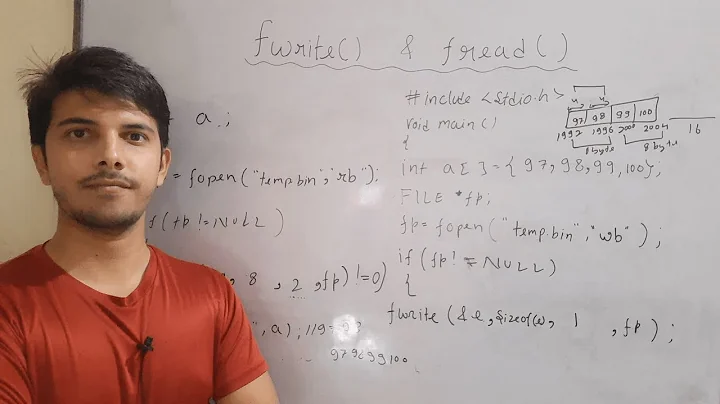How to use fread and fwrite functions to read and write Binary files?
100,204
Solution 1
Open the file with mode w+ (reading and writing). The following code works:
#include<stdio.h>
int main()
{
FILE *fp = NULL;
short x[10] = {1,2,3,4,5,6,5000,6,-10,11};
short result[10];
int i;
fp=fopen("temp.bin", "w+");
if(fp != NULL)
{
fwrite(x, sizeof(short), 10 /*20/2*/, fp);
rewind(fp);
fread(result, sizeof(short), 10 /*20/2*/, fp);
}
else
return 1;
printf("Result\n");
for (i = 0; i < 10; i++)
printf("%d = %d\n", i, (int)result[i]);
fclose(fp);
return 0;
}
With output:
Result
0 = 1
1 = 2
2 = 3
3 = 4
4 = 5
5 = 6
6 = 5000
7 = 6
8 = -10
9 = 11
Solution 2
When you opened the file, you forgot to allow for reading:
fp=fopen("c:\\temp.bin", "wb");
Should be:
fp=fopen("c:\\temp.bin", "w+b");
Related videos on Youtube
Author by
user1190135
Updated on February 08, 2020Comments
-
user1190135 about 4 years
Hi in my project I've to read a .bin file which has sensor data in the form of
short(16 bit values). I'm doing this usingfreadfunction into a buffer, but I feel that the reading-in is not happening correctly. I mean there is no consistence between what I write and what I read in. Can you guys suggest what is going wrong here? This is not my code from my project... I'm only trying to verify thefreadandfwritefunctions here.#include<stdio.h> void main() { FILE *fp = NULL; short x[10] = {1,2,3,4,5,6,5000,6,-10,11}; short result[10]; fp=fopen("c:\\temp.bin", "wb"); if(fp != NULL) { fwrite(x, 2 /*sizeof(short)*/, 10 /*20/2*/, fp); rewind(fp); fread(result, 2 /*sizeof(short)*/, 10 /*20/2*/, fp); } else exit(0); printf("\nResult"); printf("\n%d",result[0]); printf("\n%d",result[1]); printf("\n%d",result[2]); printf("\n%d",result[3]); printf("\n%d",result[4]); printf("\n%d",result[5]); printf("\n%d",result[6]); printf("\n%d",result[7]); printf("\n%d",result[8]); printf("\n%d",result[9]); fclose(fp) }After I do the fread() (HEX values):
temp.bin: 01 02 03 04 05 06 e1 8e 88 06 ef bf b6 0b...After I do the fwrite()
stdout: Result 0 914 -28 -28714 -32557 1 512 -32557 908 914-
aardvarkk about 12 yearsHave you tried closing and then reopening the file? I'm not sure what the contents of a file are if you write to it and then read to it immediately. You may have to close it first to make sure the data is flushed out? Also, make sure you open it for reading the second time around...
-
Tim Ring almost 5 yearsShould really always use 'b' in file mode if you're going to use fread/fwrite. Lots of opportunities for screw ups or odd behavior reading text files. Most implementations do text translation in fread/fwrite but, as i said, this can cause problems (translated CR/LFs can cause more data to be written or less data to be read than you intended). Use fgets/fputs to read/write text files.
-
-
pmg about 12 yearsThe mode
rwbis not recognized. I think you meanw+borwb+. -
pmg about 12 yearsWell @Richard: it isn't Standard nevertheless. see here or in this PDF.
-
trojanfoe about 12 yearsThe 'b' flag is ignored in
fopen()under Mac OS X, but not under Microsoft's implementation.







